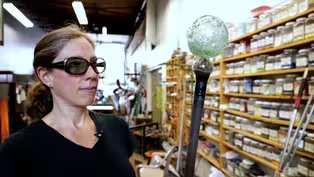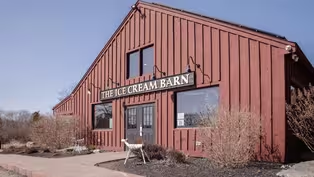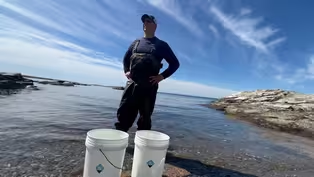
Double Trouble
Clip: Season 4 Episode 3 | 8m 5sVideo has Closed Captions
Meet Recycled media artist Sam Heydt and her father, watercolor artist William Heydt.
Meet contemporary recycled media artist Sam Heydt, whose work confronts the crises of our times, and her father William Heydt, whose classically rendered watercolor paintings celebrate the people and places of Newport.
Problems playing video? | Closed Captioning Feedback
Problems playing video? | Closed Captioning Feedback
Art Inc. is a local public television program presented by Ocean State Media

Double Trouble
Clip: Season 4 Episode 3 | 8m 5sVideo has Closed Captions
Meet contemporary recycled media artist Sam Heydt, whose work confronts the crises of our times, and her father William Heydt, whose classically rendered watercolor paintings celebrate the people and places of Newport.
Problems playing video? | Closed Captioning Feedback
How to Watch Art Inc.
Art Inc. is available to stream on pbs.org and the free PBS App, available on iPhone, Apple TV, Android TV, Android smartphones, Amazon Fire TV, Amazon Fire Tablet, Roku, Samsung Smart TV, and Vizio.
Providing Support for PBS.org
Learn Moreabout PBS online sponsorshipn blares) (bird calling) (pedestrians chattering) (upbeat music) - The people here all have a story to tell, and I try to tell their story.
To me, they're all important.
(upbeat music) This is just my little time capsule of when I'm here.
This is Newport at this period of time, going through, and this is what I'm celebrating.
(upbeat music) When I went to RISD, I majored in the discipline of printmaking, etching, and engraving.
So after graduating from RISD, I packed my bags and went to Paris, and I lived there for two years.
The early etchings had to do with fantasy circus people, characters, but they were all made up in my imagination.
After that, I came back and RISD offered me a job, teaching and printmaking.
So I taught at RISD, I taught at Massachusetts College of Art.
But then when I got married and had kids, it started moving away from the etching thing and getting into painting and photography.
I did a lot of photography.
(upbeat music) From my early etchings to the paintings I'm doing now, I try to put a sense of humor into all my work.
And even the cover of my book "Working Newport" is everyone from Stop & Shop on strike.
So they're all holding strike signs, but it says, "Working Newport."
So I try to get a sense of humor in everything I can do because life's too serious, you know.
The book came about because the collection grew to over 450 portraits.
And it became obvious that this was kind of the "Working Newport" book of different people that are just here in Newport working.
So I've just added 12 new portraits to the book.
- [Interviewer] Do you think you'll ever be done?
- (laughs) I'm 72 now.
Yes.
So I think within the next 10 years, it'll definitely be done.
But I would like to make as many as possible.
(upbeat music) - [Interviewer] It's funny that you're not in the book "Working Newport."
- Oh yeah, no, because I am not a fan of looking at me.
Sometimes when I paint people, they're like, "Well, thank you, I guess."
It's funny, because it's something that I enjoy doing for them because I make them commit to letting me do it, but I'm not sure they would seek me out normally to have the portrait done.
In fact, I can tell you they wouldn't seek me out to have the portrait done.
(bell dings) (upbeat music) Creativity is a family value.
My oldest daughter's an artist, and she's driven like I've never seen anybody driven before.
She's been a great influence, and hopefully I've been an influence on her.
- My dad's work and my work, outside of possibly the palette, couldn't really be more different in every aspect.
I mean, like, he literally is a portrait artist, and I remove the faces from my women.
(upbeat music) (singer laughing) My dad is a really talented artist.
I don't think I would be where I'm at if it wasn't for his influence on me, even though our work couldn't be any more different.
(upbeat music) Art is a reflection of and a reaction to society as much as it is just a insight into, like, the artist's mind.
You know, because everything's subjective at the end of the day.
You know, this is my reaction to the world around me.
(upbeat music) So Kitsch was a pandemic project.
It was sort of born out of needing to stay sane.
And I have, like, no business sense.
Like, everything was going out of business, and I was like, "Hmm, sounds like a great time to, like, open a business."
So I opened Kitsch.
I didn't really have anything.
I don't even know what my thinking was when I opened it.
And it was initially meant to be temporary.
Eh, I really like it.
So for now, I'm keeping it.
My interest in art was sparked at an early age.
When I was 18, finishing high school in India, I started photographing.
Then I moved on to do media and gender studies, and then, finally, went back and went back to photography.
And it was the only degree I ended up using.
When I came out of university in New York, I opened up a photo studio called Jane Street Studios in the Meatpacking District of Manhattan.
And I had it open for a few years.
So I left the media machine, and I went to Australia and started doing work on the mining industry there.
After that, I went to New Zealand and documented the deforestation.
And then shortly after that, I was in Iceland doing a project, and I was in a motorbike accident, and the motorbike accident left me bedridden for months.
In that time, I realized A, that photography really has no connection to truth.
And that was also when I began, yeah, sourcing recycled material.
(upbeat music) Even though, like, my discipline and medium has changed quite a bit over time, the focus of my work hasn't.
Whether it be the exploitation of the natural world or the exploitation of, like, the female body, that idea just sort of continued into my collage work.
My work is very much separated from myself.
And, like, I feel like a lot of other female artists are usually the subject of their art.
And I feel like that just kind of plays into, like, the tradition of women always being the subject of art, even when they're the creator.
And now that we have the opportunity to be the creators of it, it doesn't make sense to me to still stay as the subject.
So, you know, I try to, like, break free from that and hopefully create new avenues for other young female artists to follow.
(upbeat music)
Video has Closed Captions
Clip: S4 Ep3 | 6m 11s | Glass Artists Eben Horton and Jen Nauck create glass floats and hide them on Block Island. (6m 11s)
Video has Closed Captions
Clip: S4 Ep3 | 4m 54s | The Seiters show us how they make ice cream at The Ice Cream Barn in Swansea, MA. (4m 54s)
Video has Closed Captions
Clip: S4 Ep3 | 6m 3s | Join Tami and Matt Mullins and learn how they harvest artisanal reef-to-table sea salt. (6m 3s)
Providing Support for PBS.org
Learn Moreabout PBS online sponsorship

- Arts and Music
The Best of the Joy of Painting with Bob Ross
A pop icon, Bob Ross offers soothing words of wisdom as he paints captivating landscapes.












Support for PBS provided by:
Art Inc. is a local public television program presented by Ocean State Media



